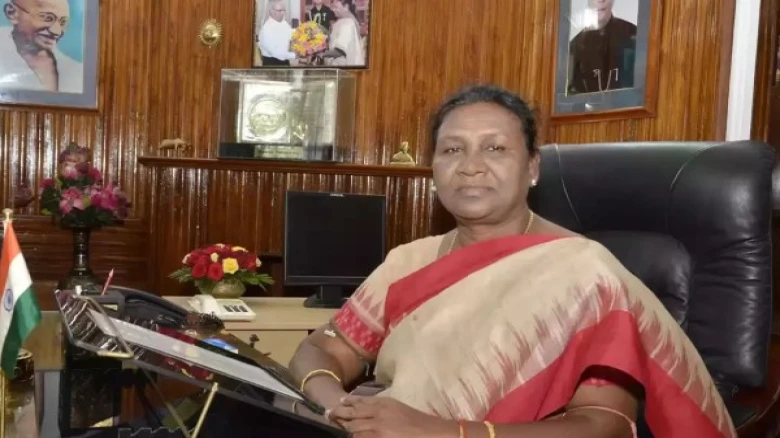Regional

The votes cast will be counted on July 21, and the next President will take the oath of office on July 25.
Digital Desk: Parliamentarians and legislators across the country voted on Monday to elect the next President, and by the end of the day, there were enough signs that NDA nominee Draupadi Murmu would easily defeat Opposition candidate Yashwant Sinha.
The results will be announced on July 21, and the new President will be swearing-in on July 25.
According to the Election Commission, "over 99 percent of the 771 Members of Parliament entitled to vote (05 vacant) and 4025 Members of the Legislative Assemblies entitled to vote (06 vacant and 02 disqualified) cast their votes today." MLAs in Chhattisgarh, Goa, Gujarat, Himachal Pradesh, Kerala, Karnataka, Madhya Pradesh, Manipur, Mizoram, Puducherry, Sikkim, and Tamil Nadu voted completely."
The EC stated that two MLAs, Anant Kumar Singh and Mahendra Hari Dalvi, were disqualified from participating in the election under Section 8 of the R P Act of 1951 as a result of the decision of the appropriate Court.
According to sources, eight MPs — Sunny Deol and Sanjay Dhotre of the BJP, Syed Imtiaz Jaleel of the AIMIM, Gajanan Kirtikar of the Shiv Sena, Mohammad Sadique of the Congress, T R Paarivendhar of the DMK, Haji Fazlur Rehman, and Atul Kumar Singh — did not cast a ballot (BSP).
Cross-voting incidents, mainly in Murmu's favor, were reported from several states, including Gujarat, Haryana, her home state of Odisha, where she served as governor, and Jharkhand. When the votes are counted, how many MPs and MLAs cross-voted will be clear.
Nearly 48% of the votes were cast for the BJP and its allies. With the support of regional parties like the BJD, YSRCP, BSP, AIADMK, TDP, JD(S), JMM, and Shiv Sena, in addition to the SAD, Murmu is predicted to receive more than 60% of the vote, making her the first woman from a tribal group to hold the top position of prevalent official.
Manpreet Singh Ayali, a SAD legislator, decided to abstain from voting and cited the BJP-led Centre, previous Congress administrations, and his own party for failing to resolve issues pertaining to Punjab. He claimed in a video message that before deciding to support Murmu, the party leadership had not consulted him or the Sikh community.
NCP MLA Kandhal Jadeja claimed to have supported Murmu in Gujarat. Jadeja received a show-cause notice from the NCP in 2020 for disobeying the whip and casting a cross-party vote in the Rajya Sabha elections.
Jadeja had disobeyed the party line and supported BJP candidates in the Gujarat Rajya Sabha elections in 2017 and 2020 rather than the Congress. Kamlesh Singh, another member of his party in Jharkhand, also supported Murmu.
In Odisha, Congress MLA Mohammed Moquim announced he had voted in favor of Murmu as she was the "daughter of Odisha."
BJP leader Pradipta Kumar Naik arrived in a wheelchair in Odisha from the hospital where he was being treated for complications related to post-Covid. He was carrying an oxygen tank. Mithilesh Kumar, a BJP MLA who was hurt in a car accident about a month ago, arrived on a stretcher to cast his ballot in Patna.
And in Chennai, the first voter in the secretariat complex was the chief minister of Tamil Nadu, M K Stalin, who arrived at the polling place straight from the hospital after being released following his recovery from Covid.
The elected MPs and MLAs make up the electoral college that uses the proportional representation system to choose the President.
Due to Jammu and Kashmir's lack of an Assembly, the value of an MP's vote in this Presidential election decreased to 700 from 708 votes. MPs, MLAs, and MLCs nominated are ineligible to vote in this election.
Each MLA's vote has a different value in each state. For example, the value of a vote per MLA in Sikkim is seven, while it is nine in Nagaland and eight in Mizoram. An MLA's vote has a value of 208 in Uttar Pradesh, 176 in Jharkhand, and 176 in Tamil Nadu.
In a first, the Commission allowed Covid-19 positive electors to vote in the final hour of polling or after all non-Covid electors had voted. According to the EC, two Covid-positive electors voted in the Tamil Nadu Assembly, and one Covid-positive MP voted in Thiruvananthapuram.
Also Read: Presidential Election 2022: Shiv Sena to Support NDA Presidential Candidate Draupadi Murmu
Leave A Comment